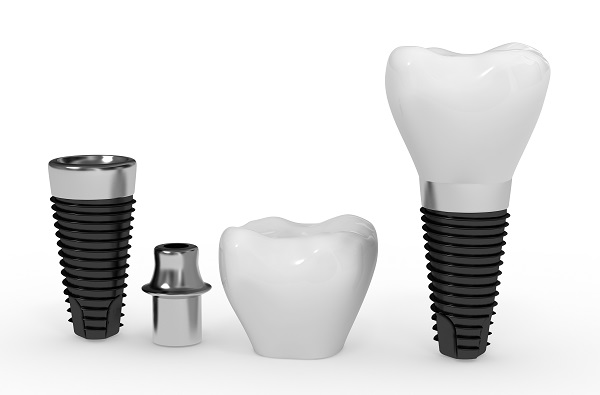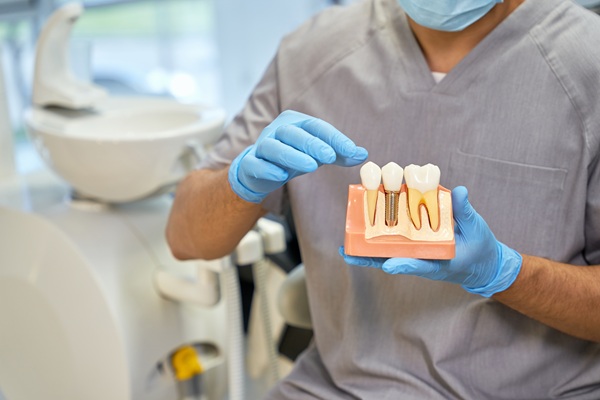How Does the Jawbone Affect the Ability to Get Dental Implants?

Dental implants are a great treatment option for patients who have lost one or more teeth. It is a solution that preserves your oral health, restores confidence and provides a youthful appearance. Many people who lose a tooth are great candidates for dental implants. This process involves placing an implant post on the lower or upper jawbone.
However, patients need to have adequate amounts of healthy jawbone tissue to be eligible for the procedure. When a person has had dental issues like periodontal disease, they might not have enough healthy bone tissue for dental implants.
How your jawbone can lose its density
For many adults, the leading cause of tooth loss is severe periodontal disease, which works to destroy the gums. The disease also destroys the jawbone structure, which is responsible for holding teeth roots in place. Once the jawbone is weak, it becomes easier for teeth to become loose. Even after getting treatment for periodontal disease, your jawbone would not receive adequate stimulation since some teeth are missing. This, in turn, leads to further bone tissue loss.
Let us look at some common causes of jawbone deterioration:
1. Tooth extractions
If a tooth is extracted and not replaced with a prosthetic, jawbone tissue loss often occurs. A tooth’s natural roots stimulate the jaw when pressure is applied to the tooth, and that keeps the soft tissue around it healthy. The alveolar bone, the part of the jawbone that holds the teeth in position, will not receive the appropriate stimulation. The net effect will be the breaking down of the jawbone.
2. Damaged teeth
If a tooth is broken by trauma and the biting surface comes off, proper bone stimulation will stop. This happens since the tooth is no longer being used to bite down on food. Some of the common causes of trauma include jaw fractures, having your teeth knocked out after an accident or an injury from a blow.
3. Misaligned teeth
Misaligned teeth can lead to a situation where there is no opposing tooth structure for some teeth. This can lead to areas in the jaw not being properly stimulated since the teeth do not make contact with one another.
Why healthy jawbone tissue is important for dental implants
Dental implants help to stop the jawbone deterioration that occurs as a result of missing teeth roots. A healthy jawbone is needed to secure implants, so a dentist might recommend bone grafts for patients who do not have the necessary amount of bone tissue.
Jawbone grafting is the surgical process of adding biocompatible bone structure to the jawbone. Once the procedure is complete, the jawbone should be strong enough to support the implants. You will need to wait until your jaw has fully healed from the graft before proceeding with implant installation. This can take up to four months.
Are you a good candidate for dental implants?
Stop by our Rowley office to find out more about the health of your jawbone and see if you qualify for dental implants.
Request an appointment here: https://rowleyfamilydental.com or call Rowley Family Dental Center at (978) 364-8516 for an appointment in our Rowley office.
Check out what others are saying about our dental services on Yelp: Dental Implants.
Recent Posts
A dental implant provides a stable base for a natural-looking tooth replacement. This proactive solution fills gaps in the smile and maintains a healthy jaw. Respectively, the bite remains aligned, preserving the natural shape of the face. Thanks to dental implants, patients can enjoy a stable and beautiful smile that lasts.The most noticeable impact of…
A dental implants restoration can replace a missing tooth that falls out naturally, gets knocked out or is extracted. A dental implant restoration is often recommended after tooth extraction, as it prevents bone loss from occurring and offers cosmetic and functional benefits. There are several ways to replace a missing tooth after an extraction, including with…
If an implant dentist has suggested replacing a lost tooth or teeth with dental implants, it might help learn about the cosmetic benefits of that choice. Dental implants are a durable and reliable solution for missing teeth and the benefits are remarkable. By replacing lost teeth, patients can get their smiles back as well as…
Seeking a straighter smile often begins with a visit to a cosmetic dentist. These professionals offer advanced teeth straightening options that improve alignment while also considering the appearance of the entire smile. Whether correcting mild crowding or closing noticeable gaps, a cosmetic dentist evaluates structure, bite, and facial balance to create a personalized plan that…


